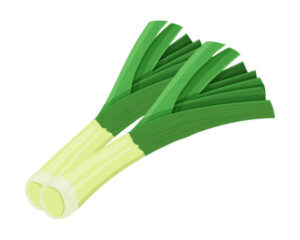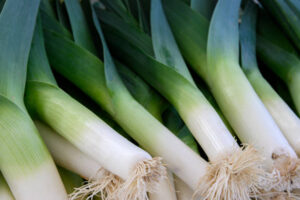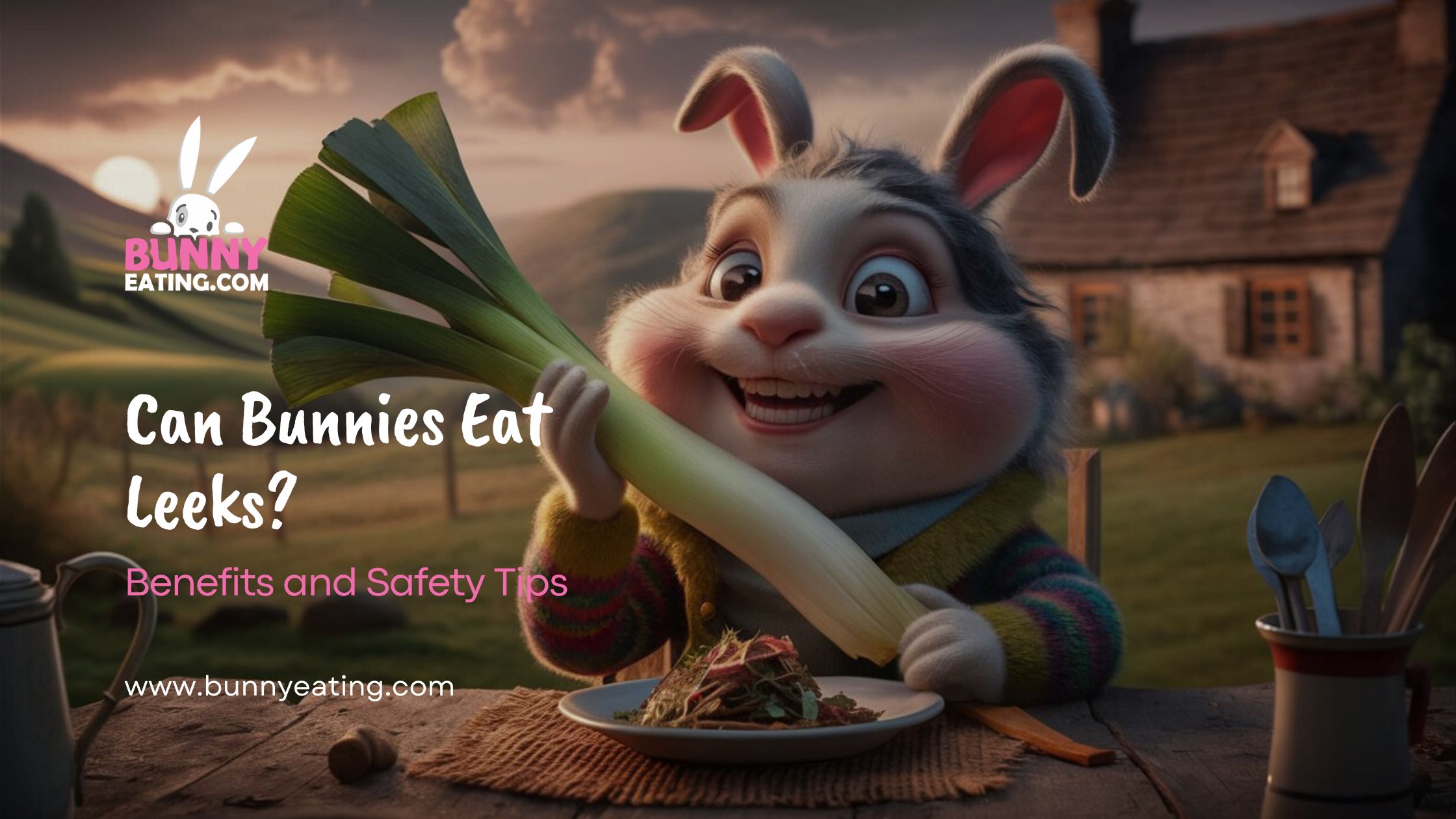Got confused if leeks can be used as a safe treat for your bunny’s favourite food. Enter our guide and you will unravel the best way to feed leeks to your rabbits. From the possible risks and consequences for your pet to the safe substitutes and feeding instructions, we have everything you need. The best way to stay focused is to dive right into stuff about leeks and bunnies! Can Bunnies Eat Leeks?
Risks of Feeding Leeks to Your Rabbit
Leeks, while tasty for humans, can be a bit risky for rabbits. They belong to the Allium family, which includes onions and garlic. These veggies contain compounds that can be harmful to bunnies, potentially causing gastrointestinal upset and even poisoning in large quantities.
Effects of Leeks on Rabbits
If a rabbit nibbles on a small piece of leek, they might experience tummy troubles like diarrhoea or stomach pain. In severe cases, it could lead to more serious issues like anaemia or damage to their red blood cells.
Nutritional Value of Leeks for Rabbits
While leeks contain some vitamins and minerals, like vitamin K and manganese, they’re not essential for a rabbit’s diet. Bunnies get all the nutrients they need from hay, fresh veggies, and a small amount of pellets.
Why Leeks Are Harmful to Rabbits
The compounds in leeks, particularly thiosulfate, can disrupt a rabbit’s delicate digestive system. This can lead to discomfort and potentially dangerous health issues.
Store-bought leeks and Rabbits
Store-bought leeks are no different from those grown at home. They still pose the same risks to rabbits if consumed. Can Bunnies Eat Leeks?

How Often Can My Rabbit Eat Leeks?
It’s best to avoid feeding leeks to your rabbit altogether. While a tiny nibble now and then might not cause harm, it’s not worth the risk.
Monitoring Your Rabbit’s Health
Keep an eye on your bunny after they’ve been near leeks. If you notice any changes in their behaviour or bathroom habits, contact your vet right away.
What Else Can I Feed My Rabbit?
Stick to rabbit-safe veggies like carrots, bell peppers, and leafy greens. These foods provide the nutrients your bunny needs without the risks associated with leeks.
Feeding Guidelines and Amount
Offer fresh veggies to your rabbit in moderation, alongside their staple diet of hay and a small portion of pellets. Aim for about one cup of fresh veggies per two pounds of body weight per day.
How to Create a Rabbit-Friendly Garden
Plant a bunny-approved garden with a variety of rabbit-safe plants, like parsley, cilantro, and dandelion greens. This way, your furry friend can enjoy fresh snacks straight from the garden.
Preparing Leeks for Rabbits
If you’re chopping up leeks for your meal, be sure to keep them well out of reach of your rabbit. Always wash your hands thoroughly after handling leeks to avoid transferring any residue to your bunny’s food or water.

What If My Rabbit Eats a Large Amount of Leeks?
If your rabbit gets into a stash of leeks and gobbles up more than just a nibble, contact your vet immediately. They can advise you on the best course of action to keep your bunny safe and healthy.
Rabbit Safe Chewing Materials Include
Provide your bunny with safe chewing materials to satisfy their natural urge to nibble and keep their teeth healthy. Options include untreated wood blocks, hay-based toys, and cardboard tubes.
How to Introduce Your Bunny to Fresh Foods
Introduce fresh foods slowly to prevent digestive upset. Start with small amounts of one vegetable at a time and gradually increase variety as your rabbit’s system adjusts.
Can Rabbits Eat Leek Seeds and Leaves?
It’s best to avoid feeding any part of the leek, including the seeds and leaves, to your rabbit. Stick to safer options like leafy greens and herbs for their fresh food treats.
Tips for Serving Leeks to Bunnies
Since leeks are off the menu for rabbits, focus on serving up safe and delicious veggies like carrots, broccoli, and kale. Chop them into bite-sized pieces for easy munching and watch your bunny’s delight as they nibble away.

How Does Leek Digestion Work in Rabbits?
While rabbits are herbivores with complex digestive systems designed to process plant material, certain foods like leeks can cause disruptions. Their sensitive guts may struggle to break down the compounds found in leeks, leading to discomfort and potential health issues.
What Are the Nutritional Benefits of Leeks for Rabbits?
Leeks do contain some vitamins and minerals, but rabbits can obtain these nutrients from safer sources like leafy greens and hay. Avoid the risk of feeding leeks to your bunny and stick to a well-balanced diet recommended by your veterinarian.
Can Eat Leeks Be Toxic to Rabbits?
Yes, leeks can be toxic to rabbits due to the compounds they contain, such as thiosulfate. Even small amounts can cause digestive upset and potentially more serious health issues, so it’s best to keep leaks away from your furry friend’s food bowl.
Can Eat Leeks Cause Digestive Problems in Rabbits?
Absolutely. Rabbits have delicate digestive systems that can be easily upset by foods like leeks, leading to issues like diarrhoea, gas, and bloating. It’s essential to prioritize your rabbit’s health by avoiding risky foods and sticking to a diet tailored to their needs.
When Shouldn’t You Feed Leeks to Your Rabbit?
You shouldn’t feed leeks to your rabbit at any time. While they may seem harmless, these veggies can pose serious risks to your bunny’s health. Stick to rabbit-safe foods to keep your furry friend happy and healthy.

Monitoring Your Rabbit’s Health
Keep a close eye on your rabbit’s overall health and behaviour, especially after introducing new foods like fresh veggies. If you notice any changes, consult with your veterinarian to ensure your bunny stays in tip-top shape.
What Actions Should I Take If My Rabbit Consumes Leeks?
If your rabbit accidentally eats leeks, monitor them closely for any signs of distress or illness. Contact your vet immediately if you notice any unusual symptoms or behaviour.
How Many Leeks Can My Rabbit Eat?
It’s best to avoid feeding leeks to your rabbit altogether, regardless of the quantity. Stick to safe and nutritious foods to provide your bunny with a well-rounded diet.
What if My Rabbit Accidentally Eats a Lot of Leeks?
If your rabbit manages to consume a significant amount of leeks, it’s crucial to seek veterinary attention immediately. Even a small amount of leeks can be harmful to rabbits, so prompt intervention is essential to prevent any serious health complications.

Conclusion
In summary, although leeks may look innocent, they can be dangerous to your rabbit’s health. By knowing the risks linked to feeding leeks and choosing safer options you will be certain that your pet will always enjoy good health. Bear in mind that caring for the well-being of your rabbits should be given priority by giving them the right diet of rabbit-safe foods and looking after their health. With your love and care, your bunny will live for years to come. Happy hopping!
FAQs
Can rabbits eat leeks?
It’s best to avoid feeding leeks to rabbits due to potential risks to their health.
What are the risks of feeding leeks to rabbits?
Leeks contain compounds that can cause digestive upset and even poisoning in rabbits.
Are there any safe alternatives to feeding leeks to rabbits?
Yes, rabbits can safely enjoy a variety of fresh vegetables like carrots, bell peppers, and leafy greens.
How often can my rabbit eat leeks?
It’s recommended to avoid feeding leeks to rabbits altogether.
What should I do if my rabbit accidentally eats leeks?
Monitor your rabbit closely for any signs of distress and contact your vet immediately for guidance.
What other foods can I feed my rabbit?
Stick to rabbit-safe foods like hay, fresh veggies, and a small portion of pellets to provide a balanced diet.
How can I create a rabbit-friendly garden?
Plant a variety of rabbit-safe plants like parsley, cilantro, and dandelion greens for your bunny to enjoy.
How much fresh food should I offer my rabbit?
Aim for about one cup of fresh veggies per two pounds of body weight per day as part of a balanced diet.

Admin – Pet Expert shares valuable tips on pet care, nutrition, and health, offering practical advice to help your furry friends thrive.











